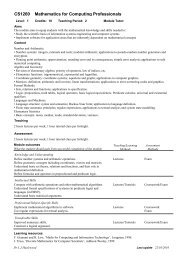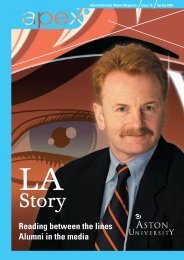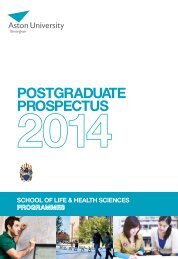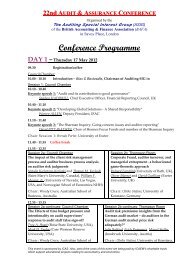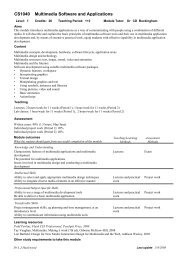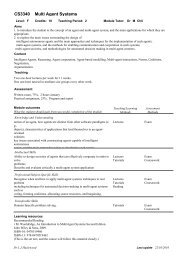Postgraduate ProsPectus - Aston University
Postgraduate ProsPectus - Aston University
Postgraduate ProsPectus - Aston University
Create successful ePaper yourself
Turn your PDF publications into a flip-book with our unique Google optimized e-Paper software.
School of Engineering & Applied Science<br />
Adaptive Communications Networks Research Group<br />
School of Engineering & Applied Science<br />
Bioenergy Research Group<br />
Group overview<br />
We focus on a range of networking architectures<br />
from wireless LANs to mobile cellular systems to<br />
adhoc wireless sensor networks. The research<br />
includes investigations of novel network architectures<br />
and protocols/algorithms for improving network<br />
performance, quality assessment of video streaming<br />
and applications of wireless networks (e.g. for<br />
e-health, ITS and smart grid).<br />
Research interests<br />
We would be interested in supervising projects in the<br />
areas of mobile cellular networks, video transmission,<br />
ad-hoc sensor networks, traffic analysis and parallel<br />
computing.<br />
Current projects<br />
Architectures and resource optimisation<br />
LTE resource management<br />
Smart grid<br />
Vehicle networks<br />
Wireless video streaming<br />
Internet traffic statistics and models<br />
Parallel computation.<br />
Specialist equipment<br />
We have access to extensive simulation facilities<br />
and specially designed software for modeling and<br />
analysing the behaviour of networks and concurrent<br />
systems. Prototype designs can be developed using<br />
modern digital electronics CAD facilities. Designs can<br />
be synthesised and implemented using state-of-theart<br />
FPGA’s including SoC (System on Chip) devices,<br />
miniature wireless sensor nodes, DSP devices,<br />
microprocessors and microcontrollers. We also have<br />
state-of-the-art graphics processing boards used for<br />
parallel computation.<br />
Funding sources<br />
The group has industrial support from Xyratex and<br />
RIM. We have also received funding from EPSRC<br />
and the TSB.<br />
Collaboration<br />
The group collaborates with the Centre for Scientific<br />
Computing at Warwick <strong>University</strong>, Toshiba Research<br />
Laboratory and Bristol <strong>University</strong>.<br />
Application and contact<br />
Research Group Convenor<br />
Professor Keith Blow<br />
E: k.j.blow@aston.ac.uk<br />
W: www.aston.ac.uk/eas/research/groups/acnrg<br />
Group overview<br />
The aim of the Bioenergy Research Group is to<br />
apply chemical engineering science and technology<br />
to the development of advanced processes for the<br />
production of liquid and gaseous fuels, chemicals,<br />
heat and electricity from biomass and wastes.<br />
The Bioenergy Research Group is a founding member<br />
of EBRI (page 97) where all its facilities and activities<br />
are based.<br />
Research interests<br />
The current activities of the group focus on<br />
fast pyrolysis and gasification of biomass with<br />
complementary work on system design and technical,<br />
economic and commercial evaluation. These include<br />
biomass preparation, fast pyrolysis for bio-oil,<br />
design, modelling, catalytic pyrolysis, optimisation,<br />
characterisation, upgrading of bio-oil, biorefineries.<br />
Current projects<br />
Member of the EPSRC sponsored SUPERGEN<br />
Bioenergy Consortium<br />
EC sponsored DibaNet working with Latin America<br />
EC sponsored BRISK infrastructure project<br />
Norwegian Research Council on fast pyrolysis for<br />
biorefineries<br />
European EERA Bioenergy consortium<br />
IEA Bioenergy Pyrolysis Task UK member.<br />
Specialist equipment<br />
The Research Group has four continuous fluid bed fast<br />
pyrolysis reaction systems for production of bio-oil with<br />
extensive supporting analytical and characterisation<br />
facilities, including micro-reactor pyrolysis with close<br />
coupled GCMS- FID and continuous micro-reactor<br />
processing systems for upgrading.<br />
Funding sources<br />
Funding comes mostly from the European Commission<br />
and other national funding agencies in Europe and also<br />
the EPSRC and DECC.<br />
Collaboration<br />
There is extensive formal and informal collaboration<br />
in 44 countries around the world through international<br />
collaborative projects and international agreements as<br />
well as informal arrangements.<br />
Application and contact<br />
Research Group Convenor<br />
Professor Tony Bridgwater<br />
T: +44 (0)121 204 3381<br />
E: a.v.bridgwater@aston.ac.uk<br />
W: www.aston.ac.uk/eas/research/groups/berg<br />
52 To find out more: Telephone: +44 (0)121 204 3400 | Email: engineering@aston.ac.uk | www.aston.ac.uk/eas<br />
www.aston.ac.uk<br />
53



